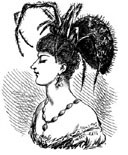
A Spiritual Journey from Jerusalem to Rome
GOODBYE JUDAISM, FAREWELL SCIENTISM, HELLO CATHOLICISM
Although I’m only 21, I’ve done a good deal of traveling and have had a number of adventures — from doing work as a health-care volunteer in the rural mountains of Honduras, to preaching on university campuses in Spain and Macedonia, to hiking out from beneath the jungle canopy and beholding the Mayan ruins of Copán. I’ve run from an angry bull, defended myself against a knife-wielding assailant, and heard bombs dropping from planes just a few miles away. But I have to say that the greatest adventure of my life has been a spiritual adventure, and my most significant journey is the one my mind and soul have taken over the past dozen years. It’s a journey that started in Jerusalem and ended in Rome — with stops in Shrewsbury to meet Darwin and in Wittenberg to see Luther.
How did it happen that I started in Jerusalem? My father was a Jew and my mother was a Christian. The Christianity on my mother’s side was nominal, really, involving no doctrine and not even any Christian culture to speak of, apart from gifts at Christmas and candy at Easter. Church? The Bible? The name of Jesus? None of these entered the picture, not even the mention of a generic divinity. My father’s family, by contrast, contained believing practitioners of the Jewish faith and was culturally Jewish as well. So I came to identify myself with Judaism rather than with Christianity, since Judaism was really the only religion with which my family had made me acquainted. This was particularly so after my parents divorced when I was nine. My father remarried — a woman who was also a practicing Jew — and it was in their observant Conservative Jewish household that I was raised from the age of eleven. I practiced Judaism, but I didn’t believe in the contents of the Jewish faith. I was sure, like others of my friends who were Jewish, that one doesn’t need to believe in Judaism to consider oneself Jewish. We considered our Jewishness more of a cultural identification than a religious faith.
And anyway, there were problems with religious faith. My maternal grandfather, a thoughtful and inquisitive man with whom I loved to sit and talk, was my first guide into the world of the intellect, and he informed me that people had created religions because of their inability to cope with reality. My grandfather was a great believer in science, and he based his disbelief in God on the absence of empirical evidence: We couldn’t see, hear, smell, touch, or taste God. This meant that God’s existence was a fiction. Then my grandfather informed me that there was genuine, un-fictional knowledge of the nature of the universe available, and he explained to me the revolutionary ideas of Charles Darwin. Thus, between the covers of The Origin of Species I found my ticket for the first stage of my journey, from Jerusalem to Shrewsbury. Another great intellectual influence on me was my stepfather. My mother had also remarried, to a professor of social psychology, and with him, too, I eagerly discussed evolution. By the age of eleven, I was devouring books on evolution by Darwin, Richard Dawkins, Alfred Russell Wallace, and Stephen Jay Gould. Each time I picked up Darwin’s Voyage of the Beagle I felt inspired to go off on adventures across the world, discovering clues to the origin of man and searching for truth. Evolutionary study, specifically within the field of primatology (the study of apes and monkeys), became one of my passions.
Meanwhile, I continued learning about Judaism in Hebrew school and I eventually had a bar mitzvah, where a Jewish boy becomes a man, demonstrated by study of Torah and celebrated with a wild party. This marked the end of my Jewish studies — or so I thought. I’d studied Judaism solely to learn more about my family’s culture. I continued to have an anti-supernatural bias, rejecting any explanations not in the realm of science. Science was my religion, and scientists like Hawking, Gould, and Darwin, were the Fathers of my faith. I decided that after high school I would attend Miami University in Oxford, Ohio, and get a degree in biological anthropology, focusing on the study of the behavior and evolution of nonhuman primates. My path in life seemed straightforward. But my itinerary was about to change. Little did I know that I would soon be off to Wittenberg — at least, in spirit.
You May Also Enjoy
Anglican prelates are already dropping hints that they are seriously considering taking up Pope Benedict's offer to help them across the Tiber.
Becoming a Catholic is very much like a marriage, not least in the fact that you do not really know what you are getting into until you are in it.
We have some news: Elena (the Managing Editor) and I, and our two children (Maria,…

